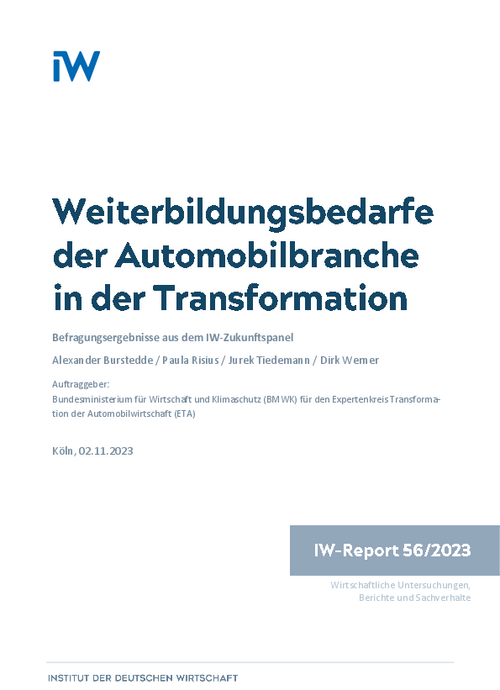Due to the ecological and digital transformation, significant parts of the German economy, particularly the industrial sector, are currently undergoing a transformation. This development also extends to the automotive sector, which occupies a vital position in the German economy.

Further training needs of the automotive industry in transformation
Expert opinion commissioned by the German Federal Ministry of Economics and Climate Protection (BMWK) for the Expert Group on the Transformation of the Automotive Industry (ETA)

Due to the ecological and digital transformation, significant parts of the German economy, particularly the industrial sector, are currently undergoing a transformation. This development also extends to the automotive sector, which occupies a vital position in the German economy.
Therefore, the competency of workers is critical for both the sectors and with regards to transitioning into new occupational profiles. The 44th survey wave of the IW Future Panel conducted in 2023 yields insight into the current impact of ongoing structural changes on companies' further training needs and further training activities, as well as their specific obstacles and individual support requirements. The results are based on a survey of 914 companies, including 170 in the automotive sector.
The survey results demonstrate that the automotive sector has been impacted to a greater extent and for a longer duration than other industries by both the ecological and digital transformations; 71.5 percent of automotive firms claim to have been affected for years (60.6 percent) or more recently (10.9 percent). On average across all sectors, however, only 62.5 percent of companies state that they have been impacted by the transformation for years (48.5 percent) or recently (14.0 percent).
Due to the significant and far-reaching impact of the automotive industry, it is essential to provide further employee training to help them effectively manage the transformation process. These training needs encompass both personal and social skills, known as soft skills, as well as professional skills, known as hard skills. Within this context, 80.3 percent of automotive industry companies report a need for further training in the area of soft skills. This is less applicable for companies in other industries, at 68.9 percent. Small and medium-sized enterprises express less desire for further training regarding soft skills than larger companies. Technical skill further training needs are present in more companies, and do not vary much based on sector or company size. 81.9 percent of companies in the automotive sector and 80.5 percent of companies in other sectors require significant or moderate further training in technical skills owing to ecological and digital changes. The findings demonstrate that companies in the automotive sector exhibit a higher demand for further training, particularly in soft skills, due to the greater impact of these changes on their operations.
Although companies recognize the importance of further training to uphold and enhance their competitiveness, many of these training courses, which are beneficial, are either not provided or not completed. This is due to various obstacles that companies face, which hinder their ability to conduct training. A key obstacle is the limited availability of time and staff shortages. Over 80 percent of all companies impacted by the digital and ecological transformation identify this as a significant or moderate hindrance. There are no systemic variances between businesses operating in the automotive industry and those in other sectors. Over 55 percent of firms influenced by structural changes regard the absence of employee self-motivation as another obstacle. The cost of further training poses a lesser challenge to businesses within the automotive industry (28 percent) than those in other sectors (37 percent).
However, companies possess comprehensive ideas about the measures that can assist them in surmounting obstacles to ongoing education. Almost 60 percent of the surveyed companies' wants can be fulfilled by networking congregations with other companies and financial backing for CET (continuing education training) participation. Interactions with amplifiers can also decrease barriers to CET and aid in developing CET measures, such as targeted consultations. Companies in the automotive sector are more in touch with economic development agencies (35.3 percent) and the Federal Employment Agency (23.7 percent) than companies in other sectors (21.6 and 8.5 percent respectively). Therefore, sector-specific knowledge should be delivered to the companies through several stakeholders in a targeted approach that assists them in overcoming hindrances to further education and understanding their unique continuing education requirements.

Further training needs of the automotive industry in transformation
Expert opinion commissioned by the German Federal Ministry of Economics and Climate Protection (BMWK) for the Expert Group on the Transformation of the Automotive Industry (ETA)

More on the topic

Valuing Companies' Data
Data is becoming increasingly important both for companies and for national economies. Since the full potential of business data can only be realised when several users exploit it simultaneously, data sharing is also becoming more common.
IW
How SMEs and start-ups cooperate in the automotive industry
Cooperation between established companies and start-ups offers expanded opportunities to innovate and drive the digitalization of the economy.
IW